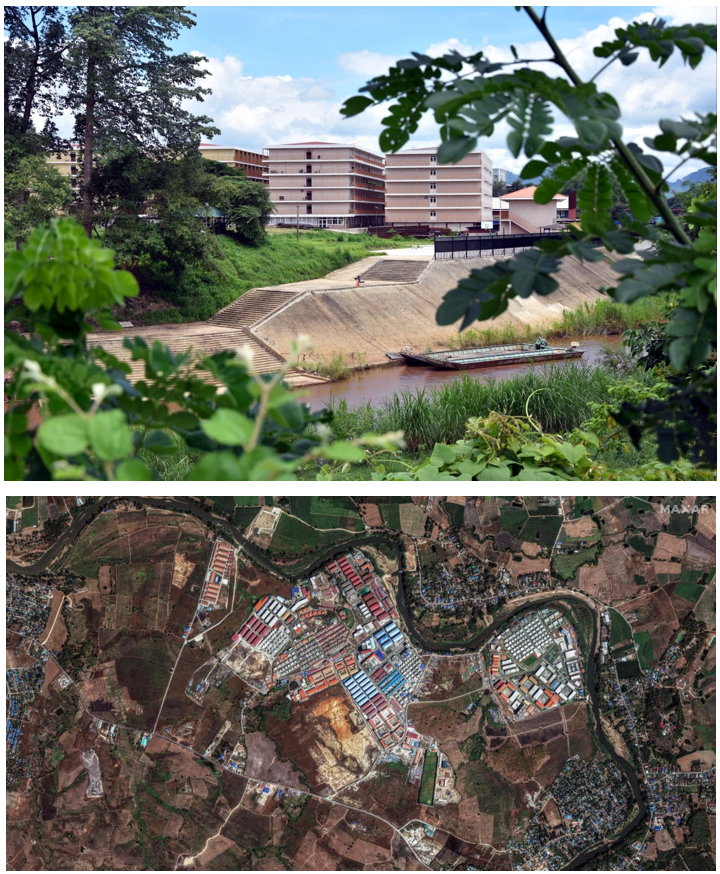Teacher
Professional
- Messages
- 2,669
- Reaction score
- 819
- Points
- 113
The investigation revealed which online crimes brought $100 million to the Myanmar fraud syndicate.
Researchers have revealed that a newly built "fraud factory" on the Myanmar-Thailand border has earned almost $100 million in less than 2 years. Details about the activities of online criminals were revealed during a joint investigation of the Chainalysis service and the human rights organization International Justice Mission.

Location of KK Park and part of the newly built quarter
The KK Park Fraud Factory and Human Trafficking Center (KK Park), located along the Moei River on the border with Thailand, is an area where thousands of workers are reportedly being held against their will. Employees of the factory are forced to engage in fraud such as The Pig Butchering Scam-a scam in which a fraudster enters into the victim's trust during online correspondence, and then fraudulently convinces her to make fictitious investments.
The investigation began after the International Justice Mission (IJM) provided Chainalysis 2 with the addresses of crypto wallets that IJM says are linked to a Chinese shell company operating in KK Park. Since the creation of the wallets in July 2022, fraudsters have been transferring funds earned during online crimes to them. Part of the revenue probably comes from transactions related to fraud on dating sites. It is also noted that the families of the abducted people had to transfer the ransom for their release to these addresses, each of which exceeded $30,000.
Chainalysis notes that these addresses are just the tip of the iceberg in the activities of scammers from KK Park, emphasizing the close connection of ransomware operations with the main activity of conducting romantic scams (romance scam). It is also emphasized that the Tether (USDT) stablecoin plays a key role in fueling the fraud economy in Southeast Asia, becoming one of the most popular cryptocurrencies used by organized criminal groups.
Recall that since the summer of 2023, China has been insistently demanding that the Myanmar authorities take tough measures against the numerous enclaves of cyber scammers operating in the border areas. The reason was a wave of fraud using the scheme of "pig butchering" (pig butchering), the victims of which were citizens of the People's Republic of China. The activities of criminal enclaves in Myanmar's border areas were based on the use of forced labor of people illegally brought there from neighboring countries.
A coalition of rebel groups in Myanmar recently successfully took control of the city of Laukkai, known as a major center of cyber fraud in the region, which affected countries, including those bordering Myanmar. The rebel coalition has clearly set out its goal — to root out organized fraudulent operations that were spread under the strict supervision of local law enforcement officers loyal to the ruling junta.
Researchers have revealed that a newly built "fraud factory" on the Myanmar-Thailand border has earned almost $100 million in less than 2 years. Details about the activities of online criminals were revealed during a joint investigation of the Chainalysis service and the human rights organization International Justice Mission.

Location of KK Park and part of the newly built quarter
The KK Park Fraud Factory and Human Trafficking Center (KK Park), located along the Moei River on the border with Thailand, is an area where thousands of workers are reportedly being held against their will. Employees of the factory are forced to engage in fraud such as The Pig Butchering Scam-a scam in which a fraudster enters into the victim's trust during online correspondence, and then fraudulently convinces her to make fictitious investments.
The investigation began after the International Justice Mission (IJM) provided Chainalysis 2 with the addresses of crypto wallets that IJM says are linked to a Chinese shell company operating in KK Park. Since the creation of the wallets in July 2022, fraudsters have been transferring funds earned during online crimes to them. Part of the revenue probably comes from transactions related to fraud on dating sites. It is also noted that the families of the abducted people had to transfer the ransom for their release to these addresses, each of which exceeded $30,000.
Chainalysis notes that these addresses are just the tip of the iceberg in the activities of scammers from KK Park, emphasizing the close connection of ransomware operations with the main activity of conducting romantic scams (romance scam). It is also emphasized that the Tether (USDT) stablecoin plays a key role in fueling the fraud economy in Southeast Asia, becoming one of the most popular cryptocurrencies used by organized criminal groups.
Recall that since the summer of 2023, China has been insistently demanding that the Myanmar authorities take tough measures against the numerous enclaves of cyber scammers operating in the border areas. The reason was a wave of fraud using the scheme of "pig butchering" (pig butchering), the victims of which were citizens of the People's Republic of China. The activities of criminal enclaves in Myanmar's border areas were based on the use of forced labor of people illegally brought there from neighboring countries.
A coalition of rebel groups in Myanmar recently successfully took control of the city of Laukkai, known as a major center of cyber fraud in the region, which affected countries, including those bordering Myanmar. The rebel coalition has clearly set out its goal — to root out organized fraudulent operations that were spread under the strict supervision of local law enforcement officers loyal to the ruling junta.

